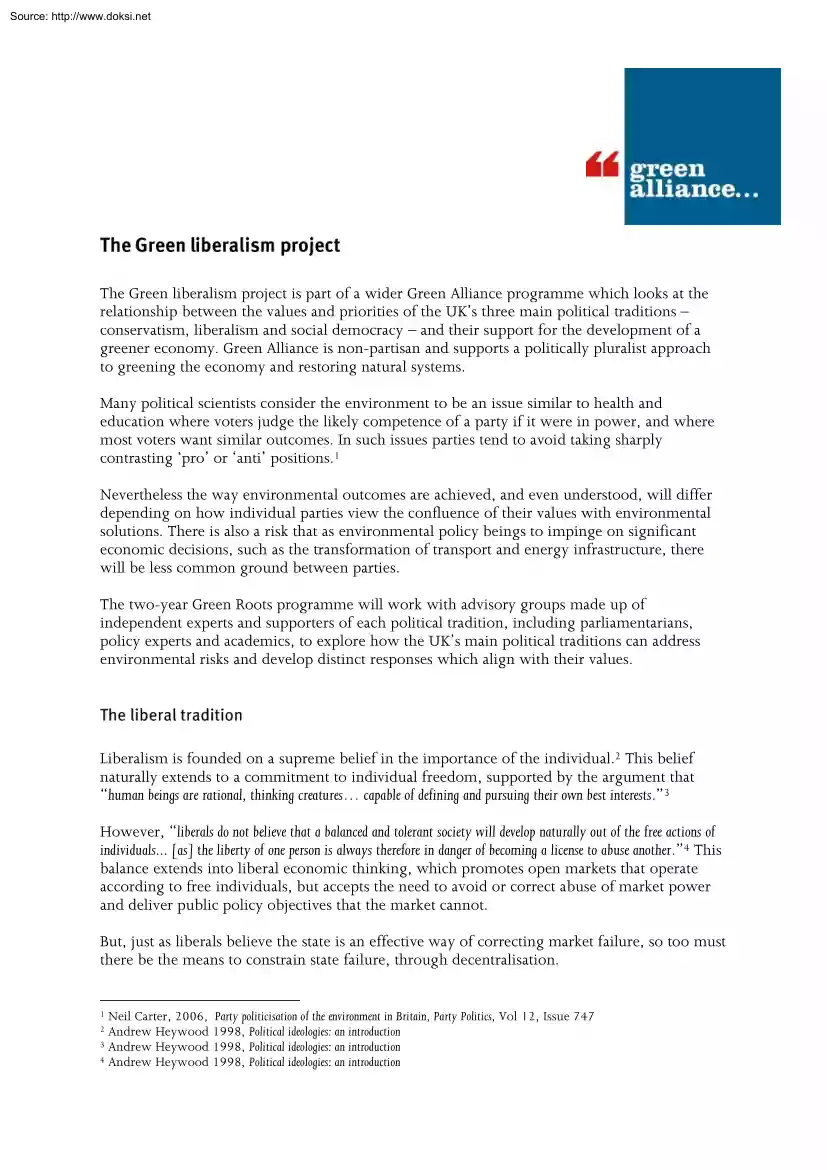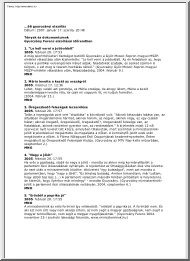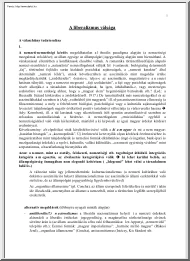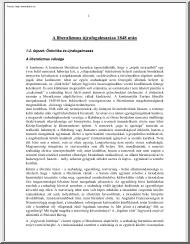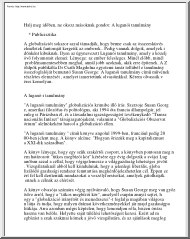Alapadatok
Év, oldalszám:2013, 3 oldal
Nyelv:angol
Letöltések száma:2
Feltöltve:2018. május 07.
Méret:688 KB
Intézmény:
-
Megjegyzés:
Csatolmány:-
Letöltés PDF-ben:Kérlek jelentkezz be!
Értékelések
Nincs még értékelés. Legyél Te az első!
Legnépszerűbb doksik ebben a kategóriában
Tartalmi kivonat
Source: http://www.doksinet The Green liberalism project is part of a wider Green Alliance programme which looks at the relationship between the values and priorities of the UK’s three main political traditions – conservatism, liberalism and social democracy – and their support for the development of a greener economy. Green Alliance is non-partisan and supports a politically pluralist approach to greening the economy and restoring natural systems. Many political scientists consider the environment to be an issue similar to health and education where voters judge the likely competence of a party if it were in power, and where most voters want similar outcomes. In such issues parties tend to avoid taking sharply contrasting ‘pro’ or ‘anti’ positions.1 Nevertheless the way environmental outcomes are achieved, and even understood, will differ depending on how individual parties view the confluence of their values with environmental solutions. There is also a risk that as
environmental policy beings to impinge on significant economic decisions, such as the transformation of transport and energy infrastructure, there will be less common ground between parties. The two-year Green Roots programme will work with advisory groups made up of independent experts and supporters of each political tradition, including parliamentarians, policy experts and academics, to explore how the UK’s main political traditions can address environmental risks and develop distinct responses which align with their values. Liberalism is founded on a supreme belief in the importance of the individual.2 This belief naturally extends to a commitment to individual freedom, supported by the argument that “human beings are rational, thinking creatures capable of defining and pursuing their own best interests.”3 However, “liberals do not believe that a balanced and tolerant society will develop naturally out of the free actions of individuals. [as] the liberty of one person is
always therefore in danger of becoming a license to abuse another”4 This balance extends into liberal economic thinking, which promotes open markets that operate according to free individuals, but accepts the need to avoid or correct abuse of market power and deliver public policy objectives that the market cannot. But, just as liberals believe the state is an effective way of correcting market failure, so too must there be the means to constrain state failure, through decentralisation. Neil Carter, 2006, Party politicisation of the environment in Britain, Party Politics, Vol 12, Issue 747 Andrew Heywood 1998, Political ideologies: an introduction 3 Andrew Heywood 1998, Political ideologies: an introduction 4 Andrew Heywood 1998, Political ideologies: an introduction 1 2 Source: http://www.doksinet Ensuring this balance, between protecting individual liberty and safeguarding that liberty from the tyranny of others is the core tension of the liberal tradition. Liberalism has
influenced all three of the UK’s political parties, but is best understood through the thinking and attitudes of the Liberal Democrats. The environment is a clear example of a context where the unlimited freedom of a few would hinder the liberty of many more. The Dictionary of Liberal Thought states: “Pollution and resource depletion are clearly major impediments to the liberal aims of freedom.”5 Charles Kennedy stated that an environmental context allows liberal ideals to flourish: “We say that a clean environment relates to health. To poverty To transport To education To civil liberties good environmental policies are about more choice, not less.” For liberals, the environment is essentially an extrinsic value, similar to economic prosperity, which allows an intrinsic value, such as freedom or equality of opportunity, to flourish. In 1979, the Liberal assembly agreed a resolution that “economic growth, as measured by GDP, is neither desirable nor achievable”, chiefly
because GDP-measured growth takes no account of the value of the environment to the individual. The spirit of this resolution flourishes today, with a focus on what Nick Clegg calls GDP+. Liberals believe that economic growth is only one way of measuring what it is government’s job to deliver – freedom. The environment does not rely on the economy, or vice versa, but both interconnected processes are crucial to the liberal ambition of ensuring personal freedom. The key question is how to balance and merge the needs of the two to ensure that both flourish, alongside individuals freedom and quality of life. The desire to prioritise the environment runs throughout liberal political history. In the UK in the 1920s, the Liberals “Yellow Book” argued the importance of the natural environment as part of an industrial strategy. The 1970s saw the Liberals become the first main party to publish a major policy paper devoted to the environment. Since the 1980s the British Liberal Party has
twice found itself working with those from other political traditions at a national level. One instance, with the SDP, the goal was a permanent merger, the other, with the Conservatives, it was to enact a one-term coalition. On both occasions, the environment has provided a useful means for liberal partners to distinguish their priorities from their allies. In 2012, for instance, Nick Clegg joked that you can’t vote blue and get green unless you add yellow, emphasising environmental protection as a core Liberal tenet. Similarly, during the Liberals’ alliance with the SDP in the 1980s, they fought to retain focus on the environment. As Burall argues, Liberals at the time “feared that the SDP would overwhelm their prized environmental policy gains.”6 But their joint 1983 manifesto stated: “There can be no healthy economy without a healthy environment” - the SDP had never previously made such a claim. In 1987, in the last joint SDP/Liberal manifesto before the two parties
merged, an entire section was 5 6 Duncan Brack, 2007, Dictionary of Liberal thought Paul Burall, 2007, The environment: a winner for the Liberal Democrats?, Political Quarterly, Vol 78, Issue 1 Source: http://www.doksinet devoted to ‘green growth’, and a pledge was made to ensure that “every aspect of policy would be examined for its effect on our environment.” A liberal position can become more complicated when positive environmental outcomes require the restraint of individual freedom. While not afraid of using the state as a corrective power, a liberal answer to correcting a broken environmental balance usually prefers choice, not force. Though a liberal approach accepts that sometimes choice is not an option, such as with calling for the banning of CFCs, it means a preference where possible towards nudges and indicators, such as consumption taxes and subsidies, as opposed to outright bans. However, as David Howarth has asked in a forthcoming publication, “whether
these distinctions really work in the way liberals have thought. Tax and permit trading schemes themselves ultimately depend on criminal law penalties against tax evasion and against carrying on an activity without a permit Choice is technically still present, but the pressure of regulation might be so great that a line has been crossed into oppression.” Howarth also highlights the idea that liberals should not be afraid of forcefulness if it is to enforce a wider freedom: “Political liberals never accepted unlimited freedom of enterprise, always understanding that intervention in the market was justified in order to prevent harm to others – for example, by forbidding slavery.”7 Conrad Russell articulated the nature of environmental responsibility in this way; that individuals do not hold personal power, but are trustees for a greater number of individuals, and that “sustainability is the trustee’s essential duty.” But Howarth still sees the balance between "the
liberal adherence to individual freedom, of non-interference in people’s choices and lifestyles, and their desire to limit the environmental consequences of those choices" as a delicate one, and one which "seems likely to become increasingly difficult to strike” given the increasingly urgent nature of the environmental challenge. 7 David Howarth, 2012, Green Liberalism
environmental policy beings to impinge on significant economic decisions, such as the transformation of transport and energy infrastructure, there will be less common ground between parties. The two-year Green Roots programme will work with advisory groups made up of independent experts and supporters of each political tradition, including parliamentarians, policy experts and academics, to explore how the UK’s main political traditions can address environmental risks and develop distinct responses which align with their values. Liberalism is founded on a supreme belief in the importance of the individual.2 This belief naturally extends to a commitment to individual freedom, supported by the argument that “human beings are rational, thinking creatures capable of defining and pursuing their own best interests.”3 However, “liberals do not believe that a balanced and tolerant society will develop naturally out of the free actions of individuals. [as] the liberty of one person is
always therefore in danger of becoming a license to abuse another”4 This balance extends into liberal economic thinking, which promotes open markets that operate according to free individuals, but accepts the need to avoid or correct abuse of market power and deliver public policy objectives that the market cannot. But, just as liberals believe the state is an effective way of correcting market failure, so too must there be the means to constrain state failure, through decentralisation. Neil Carter, 2006, Party politicisation of the environment in Britain, Party Politics, Vol 12, Issue 747 Andrew Heywood 1998, Political ideologies: an introduction 3 Andrew Heywood 1998, Political ideologies: an introduction 4 Andrew Heywood 1998, Political ideologies: an introduction 1 2 Source: http://www.doksinet Ensuring this balance, between protecting individual liberty and safeguarding that liberty from the tyranny of others is the core tension of the liberal tradition. Liberalism has
influenced all three of the UK’s political parties, but is best understood through the thinking and attitudes of the Liberal Democrats. The environment is a clear example of a context where the unlimited freedom of a few would hinder the liberty of many more. The Dictionary of Liberal Thought states: “Pollution and resource depletion are clearly major impediments to the liberal aims of freedom.”5 Charles Kennedy stated that an environmental context allows liberal ideals to flourish: “We say that a clean environment relates to health. To poverty To transport To education To civil liberties good environmental policies are about more choice, not less.” For liberals, the environment is essentially an extrinsic value, similar to economic prosperity, which allows an intrinsic value, such as freedom or equality of opportunity, to flourish. In 1979, the Liberal assembly agreed a resolution that “economic growth, as measured by GDP, is neither desirable nor achievable”, chiefly
because GDP-measured growth takes no account of the value of the environment to the individual. The spirit of this resolution flourishes today, with a focus on what Nick Clegg calls GDP+. Liberals believe that economic growth is only one way of measuring what it is government’s job to deliver – freedom. The environment does not rely on the economy, or vice versa, but both interconnected processes are crucial to the liberal ambition of ensuring personal freedom. The key question is how to balance and merge the needs of the two to ensure that both flourish, alongside individuals freedom and quality of life. The desire to prioritise the environment runs throughout liberal political history. In the UK in the 1920s, the Liberals “Yellow Book” argued the importance of the natural environment as part of an industrial strategy. The 1970s saw the Liberals become the first main party to publish a major policy paper devoted to the environment. Since the 1980s the British Liberal Party has
twice found itself working with those from other political traditions at a national level. One instance, with the SDP, the goal was a permanent merger, the other, with the Conservatives, it was to enact a one-term coalition. On both occasions, the environment has provided a useful means for liberal partners to distinguish their priorities from their allies. In 2012, for instance, Nick Clegg joked that you can’t vote blue and get green unless you add yellow, emphasising environmental protection as a core Liberal tenet. Similarly, during the Liberals’ alliance with the SDP in the 1980s, they fought to retain focus on the environment. As Burall argues, Liberals at the time “feared that the SDP would overwhelm their prized environmental policy gains.”6 But their joint 1983 manifesto stated: “There can be no healthy economy without a healthy environment” - the SDP had never previously made such a claim. In 1987, in the last joint SDP/Liberal manifesto before the two parties
merged, an entire section was 5 6 Duncan Brack, 2007, Dictionary of Liberal thought Paul Burall, 2007, The environment: a winner for the Liberal Democrats?, Political Quarterly, Vol 78, Issue 1 Source: http://www.doksinet devoted to ‘green growth’, and a pledge was made to ensure that “every aspect of policy would be examined for its effect on our environment.” A liberal position can become more complicated when positive environmental outcomes require the restraint of individual freedom. While not afraid of using the state as a corrective power, a liberal answer to correcting a broken environmental balance usually prefers choice, not force. Though a liberal approach accepts that sometimes choice is not an option, such as with calling for the banning of CFCs, it means a preference where possible towards nudges and indicators, such as consumption taxes and subsidies, as opposed to outright bans. However, as David Howarth has asked in a forthcoming publication, “whether
these distinctions really work in the way liberals have thought. Tax and permit trading schemes themselves ultimately depend on criminal law penalties against tax evasion and against carrying on an activity without a permit Choice is technically still present, but the pressure of regulation might be so great that a line has been crossed into oppression.” Howarth also highlights the idea that liberals should not be afraid of forcefulness if it is to enforce a wider freedom: “Political liberals never accepted unlimited freedom of enterprise, always understanding that intervention in the market was justified in order to prevent harm to others – for example, by forbidding slavery.”7 Conrad Russell articulated the nature of environmental responsibility in this way; that individuals do not hold personal power, but are trustees for a greater number of individuals, and that “sustainability is the trustee’s essential duty.” But Howarth still sees the balance between "the
liberal adherence to individual freedom, of non-interference in people’s choices and lifestyles, and their desire to limit the environmental consequences of those choices" as a delicate one, and one which "seems likely to become increasingly difficult to strike” given the increasingly urgent nature of the environmental challenge. 7 David Howarth, 2012, Green Liberalism
